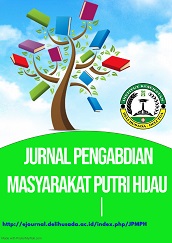PENERAPAN STRATEGI METACOGNITION PADA MEMBACA KOMPREHENSIF TEKS DESKRIPTIF DI SMA YAPIM BIRU-BIRU
Abstract
Reading is an important aspect in learning English. From reading people are able to get knowledge, new knowledge, solve problems, have broad insight, etc. However, there are very few people who like reading, including in Indonesia. Actually, to increase the love of reading, you can do it by reading the things you like first and then liking all the writings to be read. Metacognition is a strategy to increase reading interest and understand reading more quickly and accurately. Applying metacognition strategy has an effect on student reading which has been studied in G, Sulastri's previous research. So the author does Community Service at SMA Yapim Biru-biru at XI year with 36 students. Initially, the writer gave 25 comprehensive reading questions that they had to answer as a pre-test and the results were moderate for 36 students. The result value is the mean value of the Pre-test was 76.69 and the average score of the Post-test was 81.78. The results of statistical calculations show that the standard deviation in the Pre-test is 3.861 and at the Post-test is 5, 622 and the results of the statistical test (t-test) with a p value of 0.001 indicate that there is a significant increase in knowledge in the application of Metacognition strategies in reading comprehension of descriptive text at SMA YAPIM Biru-biru In XI year.
References
Guariento, W. & Morely, J. (2001). TeXIt and task authenticity in the EFL classroom. ELT Journal, 55(4), 347-353.
Hwang, C. C. (2005). Effective EFL education through popular authentic 297 materials. Retrieved
March 2005, from http://www.asian-efljournal.com/March_05_ch.pdf.
Nilsson, K. (2003). A meta-search approach to locating and classifying reading material for learners of Nordic languages. Unpublished thesis, Uppsala University.
Nunan, D. (2001). Task-based language teaching. Cambridge: Cambridge University Press












